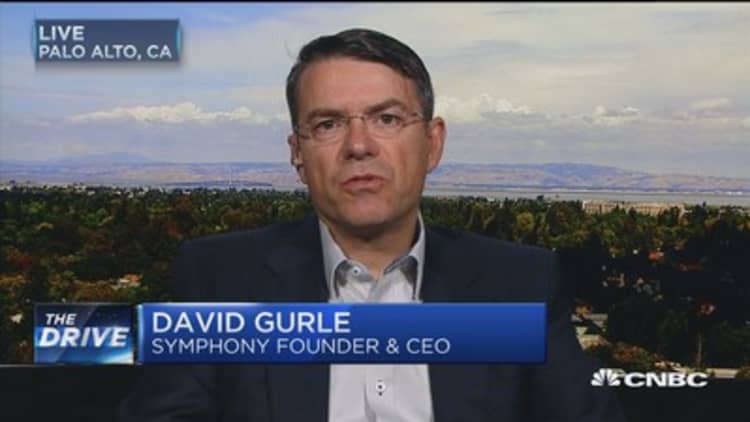Symphony, a messaging platform for Wall Street firms, has been valued at $1.4 billion, according to people with knowledge of the company.
Shortly after CNBC reported the new valuation, the start-up announced that it raised $165 million from investors to fuel its global expansion.
Symphony's latest valuation is a relatively modest increase from two years ago, when it was pegged at $1 billion in an earlier investing round. Since then, the Palo Alto, California-based start-up has more than doubled users to 430,000, exceeding the 325,000 clients of Bloomberg, a data, analytics and news company founded by billionaire Michael Bloomberg.
The reason Symphony's investors didn't value the firm higher was because it hasn't yet reached the phase of runaway growth where its user base doubles year over year, according to the people, who declined to be identified speaking about a private company's valuation.

Still, adoption of the encrypted, cloud-based messaging system is accelerating, according to Symphony CEO David Gurle.
Symphony's backers include Goldman Sachs and more than a dozen other global financial firms from J.P. Morgan Chase to BlackRock. The company, whose origin can be traced to an internal messaging program developed by Goldman, has raised a total of $460 million.
"Large institutions who bought 1,000 seats are buying 5,000 more, 10,000 more," Gurle said in a telephone interview. "Then HSBC comes in and says we are deploying this across capital markets, and those people are saying, 'OK, I need my customers on Symphony as well.' This is really happening over the last 12 months."
Turned down $200 million
That growth has happened largely among Wall Street's support employees known as the back office, who far outnumber traders and other decision-makers, he said. There are about 6 million potential users of Symphony in wholesale banking jobs globally, Gurle said.
The latest round was oversubscribed, the CEO said. He turned down an offer of $200 million at a $2 billion valuation from a single investor because he considered the terms onerous, according to Gurle.
"People want momentum companies that are on their path to profitability, and they want to get in two to three years before the IPO," Gurle said. "There's a very sweet spot for those companies, and we just made that sweet spot."
While it's the global leader by installed users, Symphony's profitability pales compared to Bloomberg. Symphony charges companies $240 per user a year, compared to about $24,000 a year for the Bloomberg terminal, which includes an instant messaging service, data feeds and news.
"We are making a dent in the Bloomberg fortress," Gurle said. "Our customers are saying, today I'm using messaging on Bloomberg to do this trade. Why can't I automate that to save operational costs and reduce errors, and do that on a completely open platform that everyone is buying into?"
Read more: There's a secretive tech fund inside Goldman Sachs transforming the bank and returning 25% a year


